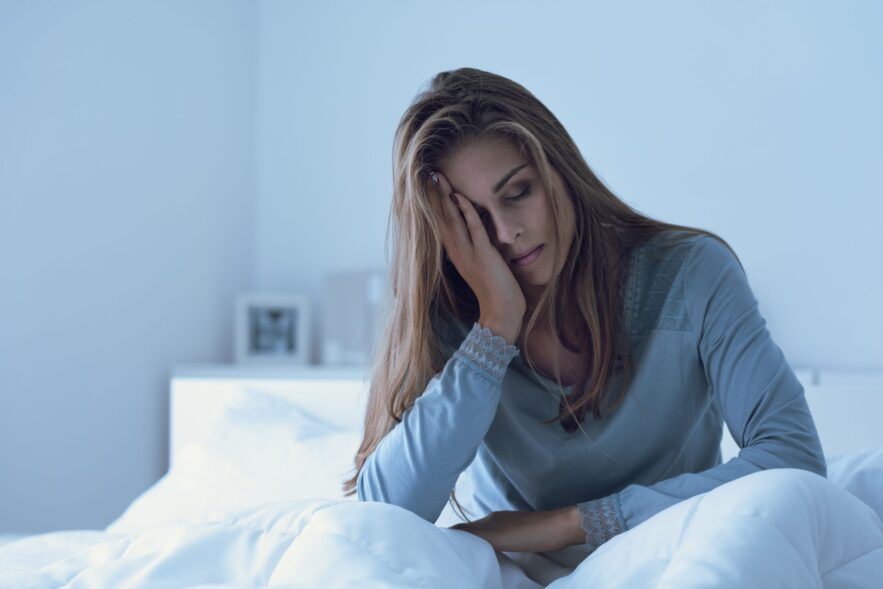The Truth About ADHD Meds and Sleep
People with ADHD (attention-deficit/hyperactivity disorder) have a harder time falling asleep — in part, says Dr. Russell Ramsay, of the University of Pennsylvania’s Adult ADHD Treatment and Research Program, because our minds won’t stop working. “There’s a delayed sleep phase onset,” he explains, a self-regulation problem that keeps people with ADHD from “recognizing the cues for sleep [and] being able to turn those into habits.” Our circadian rhythms get thrown off by little things, like eating later, and we also have a harder time avoiding late-night technology distractions that keep us from going to bed.
The problem’s so bad that ADHDers are actually 2.7 times more likely to suffer high-level insomnia than those without the disorder, per Cankaya University research released this January. Eighty percent of ADHD adults have sleep issues, per a study from The Hague, with 43 percent calling their insomnia “significant,” compared to less than 10 percent of the general population. Forty-one percent of ADHDers don’t ever get more than six hours sleep a night.
Stimulants Prescribed for ADHD Side Effect: Lack of Sleep
This, of course, is before we take stimulants prescribed for ADHD that have the unfortunate side effect of keeping people awake.
The cause of ADHD is not clear, but many scientists believe that it is caused by an underproduction of dopamine, norepinephrine and possibly serotonin — three different neurotransmitters. Neurotransmitters are chemicals that send signals from one neuron to another; dopamine and norepinephrine regulate attention. Our minds literally lack the chemical filter that neurotypical brains use to screen out excess stimuli. All three chemicals also aid in sleep: Serotonin tells our bodies when it’s safe to doze off, norepinephrine helps us wake up, and dopamine regulates circadian rhythm.
Some — but not all — people with ADHD take prescription stimulants like Ritalin or Concerta (both methylphenidates) or Adderall (amphetamine) to manage daytime symptoms. Traditionally, these medications come in a four-hour dose but, over the last 20 years or so, pharmaceutical companies have focused on creating extended-release (or sustained-release) capsules to stay in the system eight, 12, or — as with new-to-market Adhansia — 16 hours.
Problem is, there are only 24 hours in a day. A 16-hour pill only leaves 8 hours for sleep, assuming it wears off when manufacturers say it will, which rarely happens. “There’s a range of wind-down scenarios for people,” says Ramsay, “Some people will describe, ‘I can tell when the medication’s out of my system, I can feel myself coming down,’ or some people have a little irritability, they can tell it’s out of their system.” But for others, he continues, the comedown “may not be as pronounced.”
Take Daytrana (a methylphenidate), for example, a nine-hour patch that the manufacturer’s website explains can stay in the system up to 12 hours. Or Adhansia (methylphenidate hydrochloride), which has an insomnia side effect for 13 percent of adults and six percent of teens, per public relations representative Eve Zibel. “There may be either a different trajectory of coming off the medication that makes the onset of sleep a little more challenging,” explains Ramsay, or sleepless patients may have simply been more insomnia-prone to begin with.
See MedShadow’s article for more on the side effects of ADHD Meds.
All Stimulants Can Produce Insomnia
According to “Sleep and ADHD,” a 2019 University of Washington report, it doesn’t matter which prescription you take: “All stimulants can produce insomnia, with little empirical data to suggest that there are substantial differences in sleep onset latency for the different stimulant formulations,” write researchers Maida Chen, Margaret Wardlaw and Mark Stein. In children, this sleep disturbance is typically worse when taking ADHD meds for the first time or when changing prescriptions. Twenty to 30 percent of medicated ADHD children take a half-hour or longer to fall asleep even when dosage is low. The report also shows a link between insomnia severity and increased dose.
When treating kids over the age of six, physicians are able to use a dose-by-weight calculation that helps them determine how much to prescribe. But if something like that exists for adults, Ramsay isn’t familiar with it. When it comes to determining their best meds, adult prescribing tends to be lifestyle-driven. While some may find the idea of choosing medication over sleep to be absurd, Ramsay says, “Some people have longer days and a longer commute.” Others, he adds, have “expectations for some productivity at home — working at home or… being able to focus on reading a book to a child.” For those who do have fuller schedules, the need to focus for 16 hours may very well outweigh the need for sleep.
How To Avoid Insomnia Caused By Meds
To avoid insomnia caused by meds, though, Ramsay says these patients must take their medicine on time: “There may be narrower windows in terms of ensuring the timely ingestion of the medication in the morning.” Take it too late in the day and they really will be up all night. Patients should also track their sleep patterns before starting any new prescription so their doctor will have a baseline should issues occur. And, since non-time-release meds leave the system more quickly than extended-release, consider combining the two, taking a long-acting pill early in the day and a standard-release after it wears off.
Anyone who is sleep-challenged should create “a routine or a sequence of steps to promote getting in sleep mode,” according to Ramsay. Turn off all tech, get clothes and bags ready for the morning, and maybe have a light snack. Mindfulness or breathing exercises can be helpful, as well as reading — if it’s something you’ve read before. Brand-new material stimulates the mind, but sleep routines should calm the brain and body, so Ramsay says choose a book where “you [can] drop off mid-chapter.”
“Every brain is different,” he says, “so these things get personalized,” but it’s on you — and not the meds — to find the treatment/sleep balance that’s best for you.






